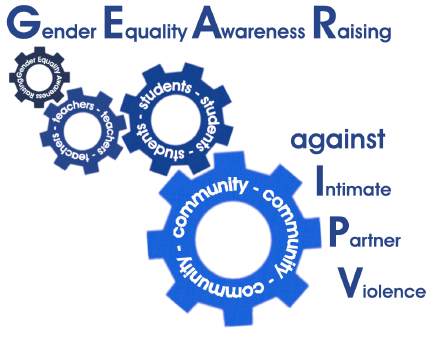In 2011, EAVN organized and conducted in Athens, a 3-day Training Seminar for Teachers and Health Education Coordinators, in the framework of the project “Gender Equality Awareness Raising against Intimate Partner Violence” (with financial support from the DAPHNE III Programme of the European Union). More information about the project can be found in the project’s website www.1st.gear-ipv.eu
Aim of the Training Seminar was to raise teachers’ awareness and build their capacity in order to implement the “GEAR against IPV” Workshops with students of secondary education in the classroom aiming to contribute to primary prevention of all types of violence against girls, including sexual coercion.
The Seminar was conducted by following the methodology described in Booklet II (Guidelines for Conducting a GEAR against IPV Teachers’ Seminar) which is part of the educational material developed by EAVN in the context of the project.

More specifically, during the 1st day of the seminar, trainees (47 teachers and health education coordinators coming from different prefectures of Greece) worked in 3 small groups in order to participate in a simulated “GEAR against IPV” workshop through students’ eyes, namely,teachers adopted the role of students and participated in experiential activities facilitated by experienced trainers. During this part only interactive activities were used so that teachers (in the same way as students) were actively involved in identifying and considering their own gender stereotypes as well as in the process of deconstructing them. Thus, teachers’ awareness raising, as well as part of their capacity building to implement the “GEAR against IPV” Workshop was based on the use of active learning techniques.
During the 2nd day of the Seminar, each participant was handed hardcopies of Booklets III (Teachers’ Manual) and IV (Students’ Activities Book), and the structure and contents of Booklets were presented, explained and discussed. Trainees were informed on how to organize and conduct the workshops, how to document and report to EAVN the implementation process and results and were informed about the evaluation design of the workshops.
The last part of the Seminar which focused on trainees’ theoretical training, aiming to build teachers’ capacity to handle cases of revealed and/or suspected abuse that might arise, either during or after the implementation of the “GEAR against IPV” Workshop, by also providing them with all information available, systematized in a way that would facilitate their use. More specifically, during this theoretical part of the Seminar information was provided to trainees regarding: a) Gender Inequality Issues: for example, what the relationship is between gender stereotypes, gender roles, gender inequality and IPV, what we can do in order to change this situation, b) Intimate Partner Violence: for example, what IPV is, forms of violence, consequences of violence for the victim, the vicious cycle of violence, the magnitude of IPV globally, at EU and at national levels, exposure of children to IPV, consequences of IPV for children, statistics, the relationship between IPV and child abuse, sources for support, c) Child Abuse and Neglect (CAN): for example, what child abuse is, forms of child abuse, statistics, what the signs are and how to recognize them, what neglect is, signs of neglect, the role of teachers (what to do, what not to do, legal framework, how to react in case of CAN disclose or suspicion of CAN, how to report and where).

The 3rd day of the Seminar was addressed only to Health Education Coordinators with the aim to discuss ways to increase multipliers and the sustainability of the “GEAR against IPV” intervention, as well as how they could support the “GEAR against IPV” implementers in the future. The topics discussed were:
- How to lobby for the inclusion of the “GEAR against IPV” Workshop in the official school curriculum
- Ways to ensure training of as many teachers’ as possible
- Ways to motivate as many teachers as possible to implement the “GEAR against IPV” Workshop in the classroom
- How to coordinate and evaluate a collective effort (e.g. implementation by many teachers in a city/municipality/prefecture/country)
- How to disseminate the results of the implementation as widely as possible, in order to fulfil two aims:
- to inform stakeholders related with the educational system of the existence of the program, its material and its results, and to apply pressure for the program’s adoption at all levels
- to raise awareness among teachers and other education-related professionals, students, parents and the general public.
The effectiveness of the Training Seminar was evaluated via four self-completed questionnaires that trainees were requested to complete at four different time intervals.
The evaluation results were quite impressive, as a) trainees reported being almost absolutely satisfied with the seminar and the educational material, and b) their knowledge on gender equality issues and relationship violence were increased as well as their self-assessed comfortableness to implement the awareness raising workshops with students and to handle cases of abuse.


